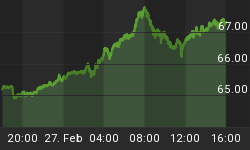Here are excerpts from recent commentaries posted at www.speculative-investor.com:
Why there is no "paradox of thrift"
The "paradox of thrift" holds that what is good on an individual basis can be bad on an economy-wide basis; specifically, it stems from the idea that an increase in an individual's savings may benefit that individual, but if many individuals increase their savings then the result will be a weaker economy.
The idea that what's healthy on an individual basis can be unhealthy on an economy-wide basis doesn't make sense because the economy is just a large collection of individuals, each of whom acts to increase his/her own satisfaction. However, it is firmly fixed in the minds of many economists and commentators because they make the false assumption that economic growth is driven by consumption. If you believe that consumption-related spending is the driver of economic growth then you will naturally view an economy-wide increase in current savings -- and a concomitant reduction in current consumption -- as a threat.
The method by which GDP numbers are concocted helps to entrench the mistaken notion that consumption drives growth, but consumption-related spending is actually at the END of a chain that begins with saving. An increase in saving supports an increase in capital investment, which, in turn, paves the way for an increase in production and, lastly, an increase in consumption. Putting it another way, before you can get a SUSTAINABLE increase in consumption-related spending you need an increase in production, but more production generally requires more investment in capital equipment and technology, which, in turn, requires more saving. That is, rather than being a threat to economic growth an economy-wide increase in saving is the necessary first step in the growth process. There is no "paradox of thrift".
Governments routinely try to get around the need for production to precede consumption. They do this by, for example, ramping up the supply of money in an attempt to encourage more spending. Inflationary policies (policies that result in more money sloshing around the economy) can, for a while, create the ILLUSION that savings have increased and that the economy is growing rapidly, but such policies ultimately lead to very bad economic outcomes -- as we are currently seeing -- because they lead to real savings being used up in business ventures and other investments that are not fundamentally sound.
The crux of the current economic malaise is that mal-investment on a grand scale over many years depleted the pool of real savings. Consequently, recovering from this situation requires the accumulation of savings -- on an individual-by-individual basis and an economy-wide basis. An increase in savings will lay the foundations for an eventual strong and sustainable recovery, whereas policies that discourage saving will act to prolong the agony.
Additional information on this topic can be found in the below-linked articles:
http://mises.org/story/2804
http://mises.org/story/3064
Another quick comment on the so-called "paradox of thrift"
In order for a baker to increase his spending he must either bake more bread or dip into his savings. If he has no savings and no capacity to increase his production of bread then he cannot increase his spending, unless he borrows the savings of others. But he may not be willing or able to borrow the savings of others, and in any case most of the 'others' may be in a similar situation. That, in essence, describes the current ECONOMY-WIDE problem, and this problem can only be solved via the accumulation of REAL savings. It most definitely cannot be solved by introducing more money into the economy or by diverting scarce resources to the government.
Increasing the money supply will, at best, lead to a fall in the value of money. We say "at best" because a fall in the value of money is the LEAST damaging effect of monetary inflation. In fact, if the only effect of monetary inflation were an evenly-dispersed fall in the value of money (higher prices throughout the economy) then people could easily take this effect into account when making investment decisions, and inflation wouldn't be a major problem for the economy. The main issue is that it is often impossible in real time to distinguish between price rises driven by sustainable changes in supply/demand fundamentals and those that are primarily the result of inflation (and are thus unsustainable). Consequently, increasing the money supply leads to mal-investment, which, in turn, depletes the pool of real savings and reduces the economy's long-term growth potential. This is why the fiscal and monetary policies that have been put in place to 'help' the economy get past the financial crisis are almost guaranteed to produce a WEAKER economy over the years ahead.
We aren't offering a free trial subscription at this time, but free samples of our work (excerpts from our regular commentaries) can be viewed at: http://www.speculative-investor.com/new/freesamples.html.















